16.3 Preparing for the Job Search
Job applicants with pharmacy experience, formalized training, and certification are considered to be more qualified than other applicants without such credentials. These, then, are the best base credentials. However, other elements, such as additional allied health certifications and varied job, volunteer, and leadership experiences, are all elements considered by employers when choosing whom to hire.
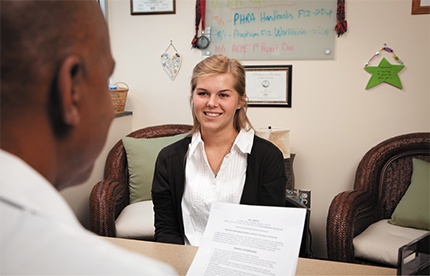
Job candidates with a wide arrange of experience fare the best when it comes to finding choice positions.
How can you get the one job you really want? Many people find the prospect of job hunting overwhelming. Try to avoid such negative thinking. Break the process into smaller steps, each one very doable. The following suggestions will help you on the path to a new job, and hopefully one you like.
Identifying Your Career Goals
Finding a job is difficult if you are not sure what you are looking for. Do you want to work in a community pharmacy? Do you want to work in a hospital, a compounding pharmacy, or a home infusion pharmacy?
 Pharm Fact
Pharm Fact
According to the National Pharmacy Technician Association, there are more than 39,000 jobs for technicians available every year.
Consider your externship experiences. What were the pros and cons of the different settings? If you were not able to gain experiences in some of the settings you may find attractive, approach a pharmacist or a technician in one of these work environments and ask politely if you might interview them. Make sure that you approach the individual at a downtime when there is little pressure or stress, such as “on break” or at lunch. Other technicians and previous graduates of your educational program can also provide valuable information about job settings and hiring practices.
Personal Survey
Think about what you want out of a job. Do you love dispensing and customer care and want to focus on these skills? Are you interested in jobs with opportunities for advancement in management, such as store manager in a chain pharmacy or as a senior pharmacy technician in the hospital? Do you want to eventually master the preparation of sterile products or the compounding of nonsterile products or specialize in ordering, inventory, and billing? Later in this chapter various career paths within and outside the profession will be discussed.
Consider how you would like your work life to fit with your personal life in terms of location, family responsibilities (including child care if appropriate), pay scale, and schedule. For instance, you often may be working nights and weekends, especially if working in a 24/7 hospital environment. Will that work for you and your family?
Creating a career is a gradual, step-by-step, experience-by-experience, position-by-position process, with each one building on the last or giving you more information about what you like and what you don’t, what you are good at and what you aren’t, where you are strong and where you need more learning and development.
Create some options for the types of jobs that may suit your ambitions, talents, acquired skills and knowledge, and life situation. Be open. Something that may seem different from what you desire, but is currently available, may turn out to be the very position you would have wanted if you had known what it was really like. When you are starting out, you may need to try tasks that you may not like but may open doors that can start you on the path toward a position that you want long term.
 Pharm Fact
Pharm Fact
Job opportunities for certified technicians are predicted to grow by 12% between 2016 and 2026.
Many schools have career counselors who can help you explore such questions. Check with your instructor or make an appointment to visit and talk to a career counselor. You may also want to use the internet or the library to obtain more background information.
Informational Interview
Once you know more about what you are looking for, start to look for professionals you know or can meet in those settings. People are often very willing to meet for an informational interview, a meeting where you are not directly seeking a job but are desiring to know more about the position. If possible, select a pharmacist or a technician you have met or observed and admire. This will allow you to offer genuine positive comments about their professional manner and show your interest and powers of observation. Such actions may encourage them to go out of their way to share time with you.
 Practice Tip
Practice Tip
Handwritten thank-you notes help people remember you well. Lack of a formal thank-you does the opposite.
 IN THE REAL WORLD
IN THE REAL WORLD
Using a combination of data sets, Timothy O’Shea, PharmD, reported in Pharmacy Times that the 10 US cities for best work and life opportunities for pharmacy technicians are the following:
Memphis, TN
Spokane, WA
Ogden-Clearfield, UT
Burlington, NC
Yakima, WA
Iowa City, IA
Santa Cruz, CA
Edison-New Brunswick, NJ
Stockton, CA
Yuba City, CA
Rankings were calculated using weighted percentages of mean annual salary, number of jobs, cost of living, location quotient, and placement in Livability’s 2016 Top 100 Best Places to Live list. For the full article and additional data, go to https://PharmPractice7e.ParadigmEducation.com/BestOpportunities.
Set up a time that fits the pharmacist’s or the technician’s schedule and preferences rather than yours. Make sure that you prepare for the informational interview by brainstorming questions ahead of time and writing them down. For instance, “What aspects of your job in this setting do you like most?” “What aspects make it the most difficult?” “What is a typical day like?” “A typical hour?” “What aspects are the most stressful?” “How do you handle this stress?” “What are you looking for in a technician in this position?” “What advice would you offer someone like me?”
Hearing the answers to some of these questions and others you have thought of will help narrow down your interests. Make sure that you follow up with a handwritten thank-you note and perhaps a gift or gift card to thank the individual for the time and effort.
Identifying and Researching Potential Employers
If your school has a career placement office, you can find out where it posts job openings registered by local employers. You can also use its career search engines and look up employers in directories.
 Pharm Fact
Pharm Fact
Without certification and experience, it will be difficult to land a position in a hospital pharmacy.
You can also explore career opportunities posted on websites and job search websites; most chain pharmacies (Walgreens, CVS, Kroger, Publix, Walmart) require an online application. Your application may be kept on file for job openings at more than one pharmacy in your regional geographic area. Many local hospitals also have websites that are used to post job vacancies; you may apply online or visit the human resources department to complete a written application and complete a screening interview. The classified ads of newspapers in print and online are also good sources of job postings.
Your state board of pharmacy as well as state community pharmacy and hospital pharmacy association offices also often post technician position vacancies. Many have offices or career centers that allow employers to post job openings and a job seeker to search for and browse available positions or post their résumé online. Examples would be the American Association of Pharmacy Technicians (AAPT) and the National Pharmacy Technician Association (NPTA). These associations may be especially valuable if you are relocating to a pharmacy in another state.
Thinking Like an Employer
Once you have zeroed in on some jobs you may want, you need to take the steps to apply. The first step is to try to put yourself into the mindset of that employer. What characteristics do you imagine that a pharmacy or human resources manager is looking for in a pharmacy technician? In a retail pharmacy, managers consider customer service. As discussed in Chapter 15, good communication and interpersonal skills are essential for the technician, who interacts with pharmacy coworkers, patients, and other healthcare professionals on a daily basis. In a hospital pharmacy, one must be content having fewer patient interactions but take satisfaction in the organization and efficiency in unit-dose filling or aseptic technique in sterile compounding.
 Pharm Fact
Pharm Fact
Did you know that over 70% of all job openings are never advertised? Employers have their own networks to identify potential candidates for hiring from family, friends, other employees, or business associates.
The pharmacy technician in any setting must enjoy performing precise work (math calculations, computer prescription entry) where accuracy can be a matter of life or death. Pharmacy technicians must also be able to maintain this accuracy even in stressful situations or while working on multiple tasks. Finally, all employers want dependable employees who show up for work on time and who are also willing to be flexible in their work schedules and take shifts for others when needed.
Establishing a Network
Networking is defined as reaching out to meet people with the specific purpose of identifying job leads. Talk to friends in person, give them a call on the telephone, or email them to let everyone know what kind of job you are looking for. Tell everyone you know that you are looking for a job. Identify faculty, pharmacists, acquaintances, friends, and relatives who may be able to assist you in your job search.
 Pharm Fact
Pharm Fact
In the general job market, most people find jobs through someone they know. That is why making a good impression in externships and internships might lead to job offers after graduation and passing a certification exam.
Make sure that you dress professionally (suit and tie for men, and modest skirt and jacket or pants and jacket for women). As a technician is unlikely to need a suit for everyday work but will need one for networking and job interviews, remember that consignment and Goodwill shops often have very nice professional clothing at affordable prices.
Be prepared to give an organized, short (less than 30 seconds) sales pitch about yourself, such as your name, occupation, current status, job opportunity you are seeking, and what you can offer. Networking may allow you to learn about a position prior to its posting or advertising.
If you complete any practical on-the-job experiences as part of your training, ask your supervisors and coworkers about anticipated openings. If there are no openings, they may be willing to serve as references for you. If you perform well as a student-in-training, then you will be viewed as a good potential employee at that site or at another pharmacy. If anyone says yes to any request, get their business card, and always follow up with a handwritten thank-you note. This is not only a courtesy, but it helps people remember you and keep their promises. Also, be willing to offer similar job-hunting help to others.
If you are new to the geographic area, check career centers at the state Department of Labor or local churches or civic organizations. A local pharmacist may know of openings in other area pharmacies. Alumni from your school program can be good connections as well. This is one of the advantages of joining in school, local, state, and national professional associations and attending meetings. These are perfect opportunities for networking with colleagues and potential employers.

Networking is a powerful tool in your job search.
 Practice Tip
Practice Tip
Social media can be helpful in your job search if you present yourself professionally. Ensure that your online presence is appropriate and something you are comfortable with potential employers viewing. Consider your posts carefully, particularly when addressing controversial topics.
If you have hospital experience or are seeking an advanced technician pharmacy role, social media outlets such as Facebook, Twitter, CareerBuilder, and LinkedIn can provide worthwhile online tools for networking. (They may not be as useful for entry-level positions.) Many of these require posting your job experiences and skills in a short form, with precise language to highlight the experiences desired by potential employers. Money magazine reported that 95% of recruiters use or plan to use social media to find and vet candidates for available positions.
Career experts recommend that you include your area of expertise, level of experience, hobbies, and a link to your LinkedIn page so that recruiters can access your résumé. Show your expertise by sharing any web links to news or information in pharmacy that is relevant to your target audience.

If you are reading Pharmacy Times or are involved in professional organizations, you will have more access to interesting news to pass on. If you use Twitter, you are allotted only 280 characters—use them wisely. First impressions count, so include a professional headshot and include your name in your handle, such as “@DonnaTaylor_pharmacy tech.” Be careful, however, and consider this tool with your instructor first as it may not be appropriate for entry-level positions and may even be considered annoying. Always use tools that most suit the type of job you are seeking.
Writing a Strong Résumé
Employers and human resource specialists are likely reviewing multiple candidates and need to have a quick, eye-catching overview of each potential hire. You may need to simply fill out an online application for the position you want, or you may need a résumé. A résumé is a brief, concise, vivid written summary of what you have to offer an employer. A résumé is an opportunity to present your work experience, your skills, your background, and your education (and certification) to an employer. Even if you only need to fill out an online application with a template, building a résumé is helpful because you can copy and paste the information in—and you won’t need to go looking for the information. Table 16.3 outlines the general topics to be included in a chronological résumé.
Table 16.3 The Parts of a Chronological Résumé
Heading |
Provide your full name, address, and telephone number. Include your ZIP code in the address, area code in the phone number (and cell phone number), and your email address so that a potential employer can contact you. |
Education |
Provide your high school or college, city, state, degree, major, date of graduation, and additional course work related to the job, to the profession, or to business in general. State your cumulative grade point average (GPA) if it helps to sell you (3.0 or higher). List any honors or recognitions received in high school or college. |
Professional Certifications |
Provide any professional certifications/licenses, such as your pharmacy technician certification, registration, CPR/first aid, and so on. You may optionally list your certification or registration number, but it is not required—simply state “available upon request.” |
Experience |
In reverse chronological order, list your work experience, including on-campus and off-campus work. Do not include jobs that would be unimpressive to your employer. Be sure to include cooperative education experience. For each job, indicate your position, employer’s name, the location of the employment, the dates employed, and a brief description of your duties. Always list any advancements, promotions, or supervisory responsibilities. Be sure to include any certifications, registrations, or licensures on your résumé. |
Skills |
If you do not have a lot of relevant work experience, then include a skills section that details the skills that you can use on the job. Doing so is a way of saying, “I’m really capable. I just haven’t had much opportunity to show it yet.” If you have foreign language or computer software skills, be sure to emphasize them. |
Related Activities |
Include any activities that show leadership, teamwork, or good communication skills. Include any club or organizational memberships as well as professional or volunteer community activities that may help sell your skills. Hobbies and interests may be listed to demonstrate your more personal side. |
References |
State that these are available on request. Speak to former employers about using them as a reference, and then have a list of references available when an interview is granted. |
Collecting Your Information
Building a résumé is intimidating for some people, but try to look at it as a good recap of your achievements. You may be surprised to find out that you have more to offer than you think; one way to start is by brainstorming and free-writing—sketch out on a piece of paper all the jobs you have had even if they were not directly related to pharmacy (include name of company, address, phone, supervisor, dates of employment, and title of your position[s]).
 Pharm Fact
Pharm Fact
October is National Pharmacy Month. Celebrate your key role in health care the whole month by thinking of a way each day that you help people heal, stay healthy, and be safe in their drug therapies.
Ask yourself for each position, what did I do each day and bring to the job that was significant? You may have cheerfully and efficiently filled orders at a restaurant. This could be a transferable skill to pharmacy dispensing. Did you get promoted? Gain new responsibilities with time? If so, write these achievements down. Use vivid action words (verbs) to describe what you did, the title, which skills you used there that may be applied to your work in the pharmacy, and what you achieved. For instance, if you worked as a warehouse clerk, then you know how to work with inventory. Or perhaps you were a maintenance worker at a hospital—you learned how the hospital works and the importance of cleanliness and infection control. Or perhaps you worked at a clothing shop; you can highlight your customer service skills and ability to select products unique to the needs of each customer.
Do not forget to consider any volunteer or leadership experiences you have had. Just because you did not get paid does not mean that these experiences are not important. They tell key things about who you are, what you care about, your initiative, and how responsible and self-initiating you can be. Sketch those experiences as “positions” (include name of organization, address, phone, key contact, dates of engagement and leadership, and title of what you did). For instance, you may have been in a club and organized a coat drive for needy children and helped make signs to get the word out to others. This shows drive, compassion for potential community pharmacy customers, and the ability to market an event. These skills could be applied to getting the word out about a flu-shot promotion.
Writing the Résumé
Résumés often follow a consistent, standard format, such as the one shown in Figure 16.1. It always starts with your name in bold and your contact information in slightly smaller type or unbolded type below, generally centered at the top. The next line, which is often listed as the “Objective” but does not have to be, is your first line or two to grab the employer’s attention and get them to keep reading. It is also like your thesis statement about yourself—it sums up what you have to offer and highlights the key points you want employers to notice. So make it fit what the employer is looking for. Make sure that it communicates what you have to offer and does not only focus on what you want.
If you are a strong writer, you can choose a format and write your own résumé, but always have a few people read it to give you feedback for revision for format, appeal, readability, and grammatical errors. You can use the Purdue Online Writing Lab, or OWL, for more résumé-writing tips at https://PharmPractice7e.ParadigmEducation.com/ResumeWriting.
There is also some excellent résumé-writing software now available, or you can contact a résumé-writing service. Your résumé is your ad or marketing tool, and the product you are selling is yourself, so you want it to be great.
Entry-level résumés are best limited to a single page. You can write a base résumé, and use it as the template. Tweak and tailor each résumé and its accompanying cover letter to the specific job and company you are contacting. For each company, do a quick online search (or better yet, visit) so that you know something about the organization and the specific position. Pay attention to the key words used in any job postings, and use a few of those in your résumé if you can do so naturally. You want your résumé to stand out in the crowd of résumés and job applications. You can do this by knowing something about your audience and tailoring your appeal to their needs. For instance, if you are applying to a hospital, emphasize the section in your résumé that has to do with hospital experiences.
 Practice Tip
Practice Tip
Mistakes on your résumé may affect your prospective employer’s confidence in the accuracy of your work. Consider having several trusted reviewers edit your résumé before submitting it to a potential employer.
If you are sending your résumé by mail or delivering it in person, print it out on high-quality 8½ × 11-inch paper. Special résumé paper is available from stationery and office supply shops. Remain conservative when selecting stationery to convey a professional image.
Figure 16.1 Sample Résumé
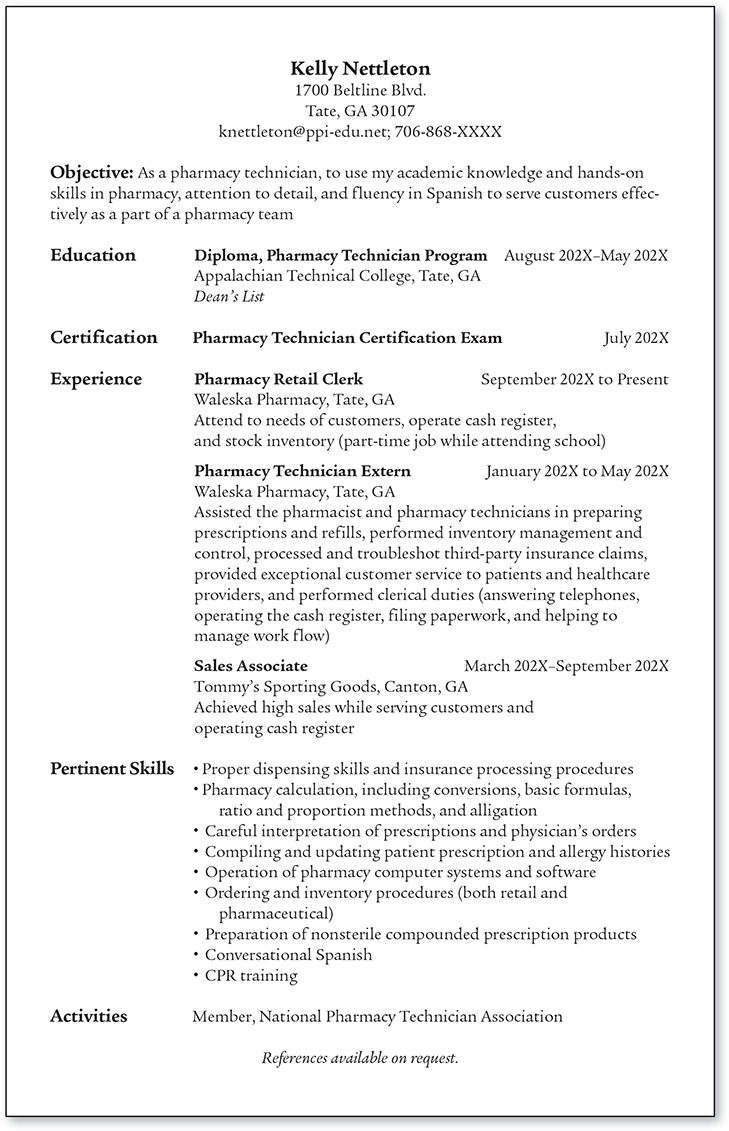
Be sure to read your résumé aloud word by word to see how it sounds to an employer. Check it numerous times for errors in spelling, grammar, usage, punctuation, capitalization, and form. Once your résumé is complete, always have another person (or a few people) proof it for any typos or final overall impact. Polished résumé in hand, visit retail and hospital pharmacies in the area. If they do not have a current opening, leave the résumé on file for future contact. Introducing yourself in person and handing it to someone is best (if you dress appropriately). If you do this, potential employers see your personal touch and determination, and they are likely to remember you.
If you are submitting your résumé online, be careful to cut and paste your polished résumé into the correct slots. Read it over and proof each section before clicking “send,” as you cannot get it back! Online job applications and résumés are convenient but not always the preferred route. The disadvantages of online applications are that they are less personal, the employers have no face to match with a name, there is an increased number of applicants, less room for creative expression, and, occasionally, some fees at the job search website.
Curriculum Vitae
Another form of summing up one’s experiences is the curriculum vitae (CV or vitae), also known as an academic vita. This format is used when more detail is needed. It often uses paragraphs to communicate specific themes and is commonly used in academic service. If someday you decide to teach future pharmacy technicians, then you may want to use a CV. Otherwise, it is best to stick to a résumé or an online submission based on a fine-tuned résumé.
 Practice Tip
Practice Tip
The cover letter is especially important for online job applications, as the employer may not have the time to review all résumés but will scan the letter to screen for qualifications.
Writing a Strong Cover Letter
A cover letter, or letter of introduction and application, usually needs to accompany your résumé and set the scene for reading it. It is your first communication to the prospective employer, often in response to a specific job advertisement or postingv, but also for unposted jobs to businesses you would like to work for.
Overview of the Letter
The cover letter should highlight your knowledge of the business and suitable qualifications, calling attention to your résumé, preferably in a one-page format. It should be in a business format and have margins of at least one inch on all edges. The cover letter is especially important for online job applications, as the employer will scan the letter for qualifications and personality to decide whether the résumé is worth reading. The cover letter is where your research on the company and position will really come to the forefront.
 Pharm Fact
Pharm Fact
Pharmacists may have various degrees or titles: Registered Pharmacist (RPh), Bachelor of Science in Pharmacy (BS Pharm), Doctor of Pharmacy (PharmD). Make sure to get the right one!
Hand-delivered or mailed, the cover letter should be printed on the same kind of paper as the résumé, and both should be placed in a matching business envelope. The letter should be single-spaced, using a block or modified block style. In the block style, all text begins at the left margin. (See Figure 16.2 for a sample cover letter and Table 16.4 for the content and format.) In the modified block style, the sender’s address, the complementary close, and the signature are left-aligned in the center of the paper, and all other parts of the letter begin at the left margin.
Greeting Line Address the letter, whenever possible, to a particular person by name and by title, and make sure to identify the position for which you are applying. Sometimes it takes extra investigation to find out these details, but it shows initiative and professionalism when the letter is addressed to the specific person (with their correct degree and title) doing the hiring—for example, the director of pharmacy, the pharmacist supervisor, or the human resources or store manager. Some business letter formats now simply put the person’s name with the title and a colon to open the letter instead of including “Dear.” For instance, “Pharmacy Director Sean Casey:” might work. Make sure that you spell the person’s and business’s names correctly.
Figure 16.2 Sample Cover Letter in Block Style
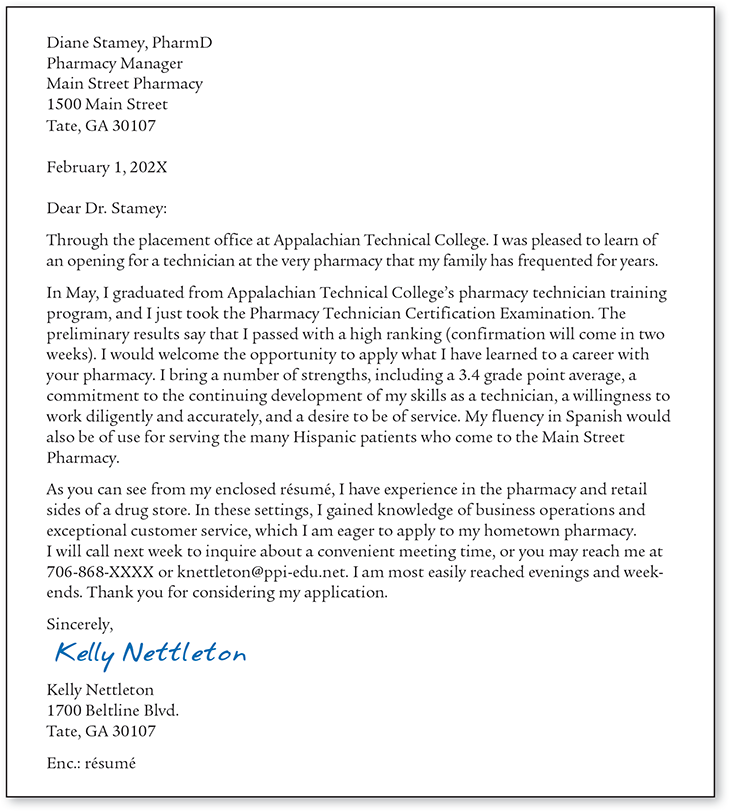
 Work Wise
Work Wise
Call the pharmacy, receptionist, or secretary at the employer’s office to confirm the correct spelling of the recipient’s name and their title. No one likes to receive correspondence with their name or that of the business spelled wrong. That could lose you the job opportunity.
Opening Paragraph In your initial paragraph, you must attract the employer’s attention and demonstrate that you understand the business’s mission and have something the company needs to meet its goals. This may take some investigation, but it shows desire and thoroughness. Make clear what specific position or type of work you are seeking, and whether you are interested in full- or part-time work. If you learned of the opening through someone in your network and that of the pharmacy, mention who told you about the position. It may help get the employer’s attention. Describe how you would fit within the organization and its goals with your skills.
Table 16.4 Suggested Format for Cover Letters
First |
Catch the employer’s attention with qualities that make you uniquely qualified for the position. Make clear the specific position or work you are seeking and what you have to offer that will further the business’s mission. |
Second |
Explain why you are interested in the position, the organization, or the organization’s products and services. State how your academic background makes you a qualified candidate for the position. If you have had some practical experience, then point out your specific achievements. |
Third |
Refer the reader to the enclosed or attached résumé: a summary of your qualifications, training, and experience. If specific items on your résumé require an explanation, then tactfully and positively point them out. You can include work experience from outside the pharmacy field, but be sure that it relates to skills that you will use as a technician. |
Fourth |
Indicate your desire for a personal interview and your flexibility as to the time and place. Repeat your telephone number (and cell phone number), as well as the best times to reach you in the letter. If you use email as a preferred method of communication, then let the employer know that. Close your letter with a statement or question to encourage a response, or take the initiative by indicating a day and date on which you will contact the employer to set up a convenient time for a personal meeting. Express gratitude for their time and consideration. |
Imagine yourself as the employer: wouldn’t you rather hire someone who knows something about your company and already has a sense of your goals than someone who does not? Each cover letter should be unique and tailored, though it will have similar content for each similar position.
Body Paragraphs The next two or three short paragraphs should explain why you want the position and highlight qualities about yourself (practical pharmacy skills, experience, personality, leadership) the company could use, as well as qualities unique to you. This is your opportunity to share what makes you an attractive candidate. If you have graduated from an ASHP-accredited training program and achieved CPhT certification, be sure to emphasize those qualifications, as they may separate you from other applicants in states that do not require these as standard.
Highlight skills, initiative, or responsibilities that can carry over from the experiences on your résumé to your work as a technician. Perhaps you learned how to work well with people in a retail job, or how to help someone handle money and insurance while in a high school accounting internship experience, or how to do careful measurements and conversions in a landscaping or catering job. All of these qualities can be called out as preparing you to help customers in a community pharmacy. Or perhaps you were a hospital volunteer or worked with patients in a residential care unit and saw how important the medications were to the seniors you worked with. If you have hospital-related experience and are applying for a hospital position, be sure to mention that in your cover letter.

Taking the time to draft a personal cover letter that fits the job and you is important. Always get someone else’s impression of it, revise it, and then read it out loud.
If specific items on your résumé require an explanation, then tactfully and positively point them out. This might include taking time out of the workforce to raise children or care for an elderly parent, or it may be related to a health issue like a surgery. Put a positive spin on the reasons.
Table 16.6 Guidelines for Job Interviews
|
What did you learn from these experiences that helps make you a better pharmacy technician? Perhaps you helped your diabetic grandfather with his injections and were trained in how to do this by a kind pharmacist and that made you want to be a pharmacy technician. In a short sentence, note this. If your grades are average (you don’t mention this!), state instead how you have received consistently high recommendations from your professors and preceptors at your externships. For instance, you could mention that Pharmacist Darlene Casey at Walgreens said you were “a quick learner, dependable, easy to work with, and accurate.”
Closing Paragraph Refer the reader to any letters of reference from your instructors, preceptors, and former employers. Indicate your desire for a personal interview and your flexibility as to the time and place. Repeat your cell phone or contact telephone number from the top of your résumé, as well as the best times to reach you, in the letter. Also include your email address, and check your inbox regularly. IIt’s always nice to end by thanking the prospective employer for their consideration. You might also mention a date and time in the future when you plan to follow up with them.
Professionally Polishing the Letter
As with your résumé, read your cover letter out loud so that you can hear it many times. Have others read it and make any corrections needed. Proofread the cover letter carefully for errors in spelling, grammar, usage, punctuation, capitalization, and form. A poorly written cover letter detracts from even the most professional résumé.
Preparing for the Interview
Review your research on the employer and role-play an interview situation. Again, put yourself in the position of the employer. Brainstorm questions they may ask, and make a list. Consider those and the questions in Table 16.5, and prepare the wording of your answers.
Be prepared for questions like, “What do you consider your greatest strength for this position?” “What do you consider your greatest weakness in this job?” Consider these questions carefully and come up with strategies to overcome your weaknesses or turn them into a strength. Remember that every strength can become a weakness when taken to an extreme or out of context. Perhaps you are good at speaking up about what things can be improved. But this is a weakness if you do it too often, too soon, too brashly, or without gratitude or thought for those who set up the current system.
Perhaps you feel you are too shy. Being shy can make you very observant of people, and so you know better how to serve them and speak up when you need to. Think about your strengths and weaknesses, what the “other side” of them can be, and how to use them to serve the pharmacy so you can be prepared for this question.
Preparing for Questions
Some interviewers pose hypothetical situations and ask for your response, or they may ask you to describe a past experience and how you handled it. These types of questions require you to think on your feet and talk about your problem-solving skills. At the least, be ready to describe a situation or two from your past where you had to deal with a difficult coworker or member of the public. Choose a situation where you were pleased with how you responded, and describe the measures you took to improve the end result.
Interviewers should not ask you questions about your religion, marital status, or if you have or plan to have children. You are not obligated to answer questions such as these.

Before an interview, it’s always a good idea to research a company and, if possible, the people you’ll be interviewing with.
After you have brainstormed some questions that you may be asked, come up with some strong questions you can ask the interviewer, such as “How would you describe the patient base of this pharmacy in terms of types of most common prescriptions?” “Do technicians work here in a team setting or more independently?” “What qualities are you looking for most in a technician?” “What is a typical shift like?” and “What do you see as the most challenging aspects of the position?”
Table 16.5 Potential Interview Questions
|
If the opportunity arises toward the end of the interview, then be sure to ask any questions that you may have—such as typical work schedule, weekends, vacation, benefits, orientation schedule, and so on. Some employers will cover the cost of annual registration, the PTCB exam, and continuing education. These questions, though, should come towards the end of the interview if the employer has not already explained them. You need to find out about the nature of the job first.
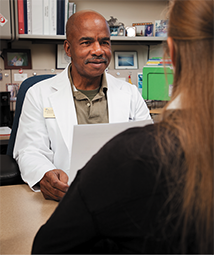
If possible, find someone with knowledge of your field to role-play an interview with you.
Role-Playing the Interview
Once you have written down the questions you may be asked and all your answers, and you are prepared with some you can ask, have different people play your interviewer so you can practice. Ask them to come up with questions you have not thought. Rehearsing out loud can help you identify wording choices and avoid mixing up words during the actual interview. When coming up with your responses, bear in mind the employer’s point of view. Imagine what you would want if you were the employer, and then take the initiative during the interview to explain to the employer how you can meet those needs.
You can do this role-playing with a study group. This may be a great group activity in your training program.
Handling the Interview Well
You should plot out how to get to the interview location the day before, and have a backup to get there if something falls through. (It’s best to do a test run to get to the pharmacy a day or two before, and perhaps observe it to get ideas for questions you may want to ask.) Get plenty of sleep, eat well, dress professionally, leave with plenty of time in case of a delay in traffic or transportation, and don’t be afraid of the stress of excitement. Tell a joke or have someone else tell you some so you can laugh ahead of time and be at ease and let your self shine through naturally. The guidelines provided in Table 16.6 can serve as reminders of key tips.
Table 16.6 Guidelines for Job Interviews
|
Avoid the Pitfalls
According to a USA Today poll of more than 1,900 job interviewers, the following are the most important factors in how to “blow your interview”:
Not learning about the job or organization (26%)
Being arrogant (21%)
Showing up late (15%)
Not asking any questions (12%)
Not speaking professionally (6%)
Be cognizant of these pitfalls and come to the interview interested and prepared.
Following Up
After the interview, follow up with a written note thanking the interviewer for seeing you and (within an appropriate time) follow up with a telephone call. Be persistent but not pushy. If you did not get the position, then thank the employer for the opportunity to interview and request that the company keep your cover letter and résumé on file for consideration of future positions.

Always express gratitude for the opportunity to interview, both in person and (later) in writing.
Handling Performance Reviews
Congratulations, you got the job! If you have not worked before or if your work experience has been sporadic, then getting used to your job as a technician might seem like acclimating to life in a foreign country. You have to adjust to a new work culture, different behaviors, responsibilities and expectations, unfamiliar customs, and even a new language—the technical scientific jargon of the profession.
Your orientation will include experience and self-study on the computer of pertinent policies and procedures specific to your organization. Then you will begin your work as a technician. If you are not certified yet, your organization may require you to be within the next 6 to 12 months.
 Practice Tip
Practice Tip
Unreliable employees in the healthcare industry do not keep their jobs for long, so make sure that your employer can always depend on you to arrive at work on time.
Many pharmacy technicians may be hired on a contingency basis. A performance review is completed by your pharmacy supervisor initially after three to six months, then annually thereafter.
You will be evaluated in many different concrete, measurable areas such as:
attendance and timeliness (versus tardiness)
dress code compliance
computer skills and accuracy
adherence to pharmacy policy and procedures
processing of insurance claims
efficiency and accuracy in filling of prescriptions
completion of assignments
In addition to concrete, measurable skills, reviews also cover significant but less objectively measurable aspects of your performance, including the following:
customer service and phone etiquette
teamwork and ability to take correction
motivation and self-direction
improvement in learning and job skills
relationships with colleagues
relationship with supervisor
 Work Wise
Work Wise
Surprisingly, attitude is one of the greatest predictors of job success. Be positive, cooperative, self-confident, and enthusiastic.
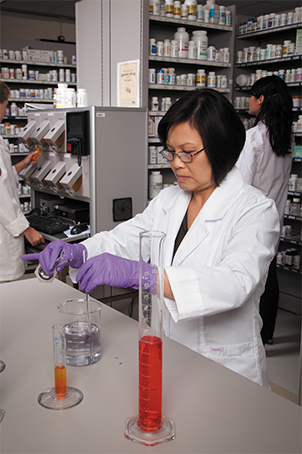
The best way to receive a good job performance review is to remain diligent in your duties.
These or similar job responsibilities, skills, and competencies are often evaluated on some sort of scale similar to exceeding, meeting, or falling short of expectations. It is common for an employer to ask you to self-evaluate your performance in each category. Your supervising pharmacist will independently evaluate your performance on the same categories. Then you will discuss your ratings, where you see things similarly, and where they are different. Accept criticism gracefully.
With determination and commitment, you will likely have met or exceeded expectations. But there is always room for growth. Most performance reviews have a process to help you determine areas that could use improvement or where you can gain greater learning and responsibility. Supervisors often ask employees to write down a personal goal or two to achieve in the upcoming months. They may then ask what things they might do to help you in your goal. After fully discussing your performance and goals, you and your supervising pharmacist may sign your review for documentation of the meeting and future reference.
After your first performance review, if you do well and stay on the job, you will likely meet with your supervisor on a quarterly, semiannual, or annual basis per policy to compare performance evaluations.